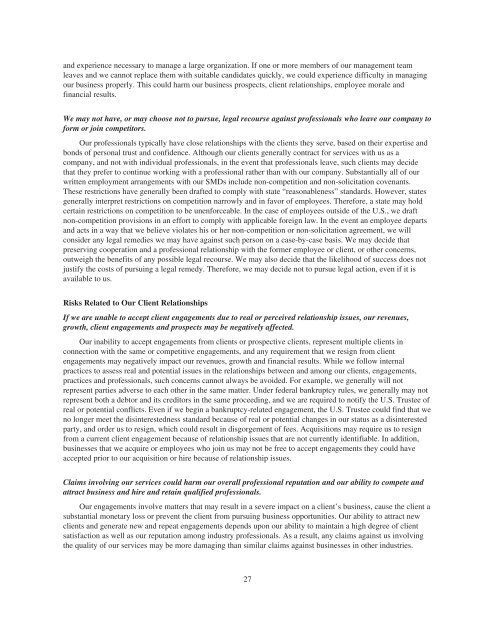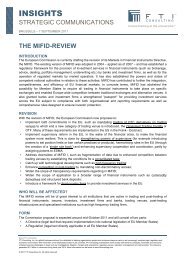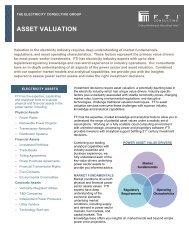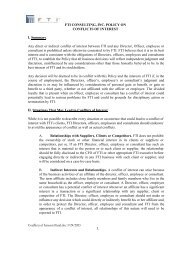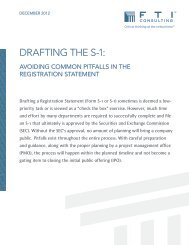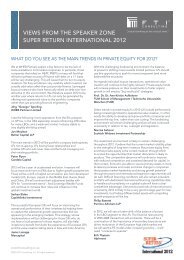footprint. We cannot assure that we will be able to attract and retain enough qualified professionals to maintainor expand our business. Moreover, competition has been increasing our costs of retaining and hiring qualifiedprofessionals, a trend which could adversely affect our operating margins and financial results.As of December 31, <strong>2009</strong>, we had written employment agreements with 189 of our 281 SMDs. Theseemployment agreements expire between 2010 and 2019, with 12 SMD agreements expiring in 2010, 53 SMDagreements expiring in 2011 and 42 SMD agreements expiring in 2012 primarily as a result of our 2006 and 2007initiatives to renegotiate long term employment arrangements with certain SMDs who have been designated asparticipants in our SMD IC Program. In an effort to reduce risk, we have included a renewal provision in most ofthe employment agreements that provides that the agreements will renew for one year, from year to year,beginning at the end of their initial terms unless a party provides written notice of non-renewal to the other partyat least 90 days prior to the date of the expiration of the initial term or any extended term. Despite the renewalprovisions, we could face retention issues at the end of the terms of those agreements and large compensationexpenses to secure extensions. There is no assurance we will enter into new long-term employment agreementswith other SMDs, although that is our intention. We monitor contract expirations carefully to commencedialogues with professionals regarding their employment well in advance of the actual contract expiration dates.Our goal is to renew employment agreements when advisable and to stagger the expirations of the agreements ifpossible. Because of the concentration of contract expirations in certain years, we may experience high turnoveror other adverse consequences, such as higher costs, loss of clients and engagements or difficulty staffingengagements, if we are unable to renegotiate employment arrangements or the costs of retaining qualifiedprofessionals become higher. The admission of additional SMDs into the SMD IC Program may result in theconcentration of expirations in future years.We incur substantial costs to hire and retain our professionals and we expect these costs to continue and grow.We make unsecured general recourse forgivable loans and grant stock option and restricted stock awards toattract and retain our professional employees. In 2006, we implemented our SMD IC Program, which is designedto align the interests of our professionals with the interests of our company and its stakeholders. The cost ofimplementing and retaining our SMD IC Program has been significant. Participants receive cash payments in theform of unsecured general recourse forgivable loans. We also make forgivable loans to new hires andprofessionals who join us in connection with acquisitions as well as current employees on a case-by-case basis.Some or all of the principal amount and accrued interest of the loans we make to employees will be forgiven byus upon the passage of time, provided that the professional is an employee on the forgiveness date, and uponother specified events, such as death, disability, termination by us without cause or termination by the employeewith good reason, as may be applicable to such loan grant. We expect to continue issuing significant amounts ofunsecured general recourse forgivable loans. We also provide significant additional payments under the SMD ICProgram in the form of stock options and restricted stock awards or, alternatively, cash if we do not haveadequate equity securities available under stockholder approved equity plans.In addition, our Economic <strong>Consulting</strong> segment has contracts with its economists that provide forcompensation equal to such professionals annual collected client fees plus a percentage of the annual feesgenerated by junior professionals working on such management, which results in compensation expense for thatsegment being a higher percentage of revenues and EBITDA than the compensation paid by other segments. Weexpect that these arrangements will continue and that the Company will enter into similar arrangements withother economists hired by the Company.We rely heavily on our executive officers and the heads of our business segments for the success of ourbusiness.We rely heavily on our executive officers and the heads of our business segments to manage our segmentsand operations. Given the highly specialized nature of our services and the scale of our operations, our executiveofficers and senior managers must have a thorough understanding of our service offerings as well as the skills26
and experience necessary to manage a large organization. If one or more members of our management teamleaves and we cannot replace them with suitable candidates quickly, we could experience difficulty in managingour business properly. This could harm our business prospects, client relationships, employee morale andfinancial results.We may not have, or may choose not to pursue, legal recourse against professionals who leave our company toform or join competitors.Our professionals typically have close relationships with the clients they serve, based on their expertise andbonds of personal trust and confidence. Although our clients generally contract for services with us as acompany, and not with individual professionals, in the event that professionals leave, such clients may decidethat they prefer to continue working with a professional rather than with our company. Substantially all of ourwritten employment arrangements with our SMDs include non-competition and non-solicitation covenants.These restrictions have generally been drafted to comply with state “reasonableness” standards. However, statesgenerally interpret restrictions on competition narrowly and in favor of employees. Therefore, a state may holdcertain restrictions on competition to be unenforceable. In the case of employees outside of the U.S., we draftnon-competition provisions in an effort to comply with applicable foreign law. In the event an employee departsand acts in a way that we believe violates his or her non-competition or non-solicitation agreement, we willconsider any legal remedies we may have against such person on a case-by-case basis. We may decide thatpreserving cooperation and a professional relationship with the former employee or client, or other concerns,outweigh the benefits of any possible legal recourse. We may also decide that the likelihood of success does notjustify the costs of pursuing a legal remedy. Therefore, we may decide not to pursue legal action, even if it isavailable to us.Risks Related to Our Client RelationshipsIf we are unable to accept client engagements due to real or perceived relationship issues, our revenues,growth, client engagements and prospects may be negatively affected.Our inability to accept engagements from clients or prospective clients, represent multiple clients inconnection with the same or competitive engagements, and any requirement that we resign from clientengagements may negatively impact our revenues, growth and financial results. While we follow internalpractices to assess real and potential issues in the relationships between and among our clients, engagements,practices and professionals, such concerns cannot always be avoided. For example, we generally will notrepresent parties adverse to each other in the same matter. Under federal bankruptcy rules, we generally may notrepresent both a debtor and its creditors in the same proceeding, and we are required to notify the U.S. Trustee ofreal or potential conflicts. Even if we begin a bankruptcy-related engagement, the U.S. Trustee could find that weno longer meet the disinterestedness standard because of real or potential changes in our status as a disinterestedparty, and order us to resign, which could result in disgorgement of fees. Acquisitions may require us to resignfrom a current client engagement because of relationship issues that are not currently identifiable. In addition,businesses that we acquire or employees who join us may not be free to accept engagements they could haveaccepted prior to our acquisition or hire because of relationship issues.Claims involving our services could harm our overall professional reputation and our ability to compete andattract business and hire and retain qualified professionals.Our engagements involve matters that may result in a severe impact on a client’s business, cause the client asubstantial monetary loss or prevent the client from pursuing business opportunities. Our ability to attract newclients and generate new and repeat engagements depends upon our ability to maintain a high degree of clientsatisfaction as well as our reputation among industry professionals. As a result, any claims against us involvingthe quality of our services may be more damaging than similar claims against businesses in other industries.27
- Page 2 and 3: 2009 was a year in which the world
- Page 5: the e-discovery market led us to cr
- Page 12 and 13: Equity Sponsor Services. Equity spo
- Page 14 and 15: Discovery Assistance. We help to dr
- Page 16 and 17: identification of relevant content
- Page 18: distinguishes us from other strateg
- Page 21 and 22: Department of Justice and Treasury
- Page 23 and 24: • Premium Brand Names with Leadin
- Page 25 and 26: Employment AgreementsAs of December
- Page 27 and 28: We have a staff of seven marketing
- Page 29 and 30: Corporate InformationFTI Consulting
- Page 31 and 32: Our segments may face risks of fee
- Page 33: could adversely affect our Strategi
- Page 37 and 38: In reaction to publicized incidents
- Page 39 and 40: we make in other business sectors.
- Page 41 and 42: Our indebtedness is guaranteed by s
- Page 43 and 44: Equity Compensation Plan Informatio
- Page 45 and 46: Share based payments to employees a
- Page 47 and 48: ITEM 7. MANAGEMENT’S DISCUSSION A
- Page 49 and 50: corporate expenses include primaril
- Page 51 and 52: clients. Margins for the year decli
- Page 53 and 54: • a significant change in the man
- Page 55 and 56: Additionally, we record deferred ta
- Page 57 and 58: Year Ended December 31, 2009 compar
- Page 59 and 60: Other Segment Operating DataYear En
- Page 61 and 62: 14.6% in 2008. The increase in SG&A
- Page 63 and 64: expense in 2009 was primarily due t
- Page 65 and 66: Amortization of other intangible as
- Page 67 and 68: Gross profit margins increased by 6
- Page 69 and 70: foreign currency translation of app
- Page 71 and 72: The availability of borrowings unde
- Page 73 and 74: Future Contractual ObligationsThe f
- Page 75 and 76: Equity Price SensitivityWe currentl
- Page 77 and 78: Management’s Report on Internal C
- Page 79 and 80: Report of Independent Registered Pu
- Page 81 and 82: FTI Consulting, Inc. and Subsidiari
- Page 83 and 84: FTI Consulting, Inc. and Subsidiari
- Page 85 and 86:
FTI Consulting, Inc. and Subsidiari
- Page 87 and 88:
FTI Consulting, Inc. and Subsidiari
- Page 89 and 90:
FTI Consulting, Inc. and Subsidiari
- Page 91 and 92:
FTI Consulting, Inc. and Subsidiari
- Page 93 and 94:
FTI Consulting, Inc. and Subsidiari
- Page 95 and 96:
FTI Consulting, Inc. and Subsidiari
- Page 97 and 98:
FTI Consulting, Inc. and Subsidiari
- Page 100 and 101:
FTI Consulting, Inc. and Subsidiari
- Page 102 and 103:
FTI Consulting, Inc. and Subsidiari
- Page 104 and 105:
FTI Consulting, Inc. and Subsidiari
- Page 106 and 107:
FTI Consulting, Inc. and Subsidiari
- Page 108 and 109:
FTI Consulting, Inc. and Subsidiari
- Page 110 and 111:
FTI Consulting, Inc. and Subsidiari
- Page 112 and 113:
FTI Consulting, Inc. and Subsidiari
- Page 114 and 115:
FTI Consulting, Inc. and Subsidiari
- Page 116 and 117:
FTI Consulting, Inc. and Subsidiari
- Page 118 and 119:
FTI Consulting, Inc. and Subsidiari
- Page 120 and 121:
FTI Consulting, Inc. and Subsidiari
- Page 122 and 123:
FTI Consulting, Inc. and Subsidiari
- Page 124 and 125:
FTI Consulting, Inc. and Subsidiari
- Page 126 and 127:
ITEM 9. CHANGES IN AND DISAGREEMENT
- Page 128 and 129:
PART IVITEM 15. EXHIBITS AND FINANC
- Page 130 and 131:
ExhibitNumber Description of Exhibi
- Page 132 and 133:
ExhibitNumber Description of Exhibi
- Page 134 and 135:
ExhibitNumber Description of Exhibi
- Page 136 and 137:
ExhibitNumber Description of Exhibi
- Page 138 and 139:
ExhibitNumber Description of Exhibi
- Page 140 and 141:
ExhibitNumber Description of Exhibi
- Page 142 and 143:
ExhibitNumber Description of Exhibi
- Page 144 and 145:
ExhibitNumber Description of Exhibi
- Page 146 and 147:
ExhibitNumber Description of Exhibi
- Page 148 and 149:
SIGNATURESPursuant to the requireme
- Page 150 and 151:
FTI Consulting Canada LLC .........
- Page 152 and 153:
The Board of DirectorsFTI Consultin
- Page 154 and 155:
Exhibit 31.2Certification of Princi
- Page 156 and 157:
Exhibit 32.2Certification of Princi
- Page 158 and 159:
CORPORATE TEAMJack B. Dunn, IVPresi


